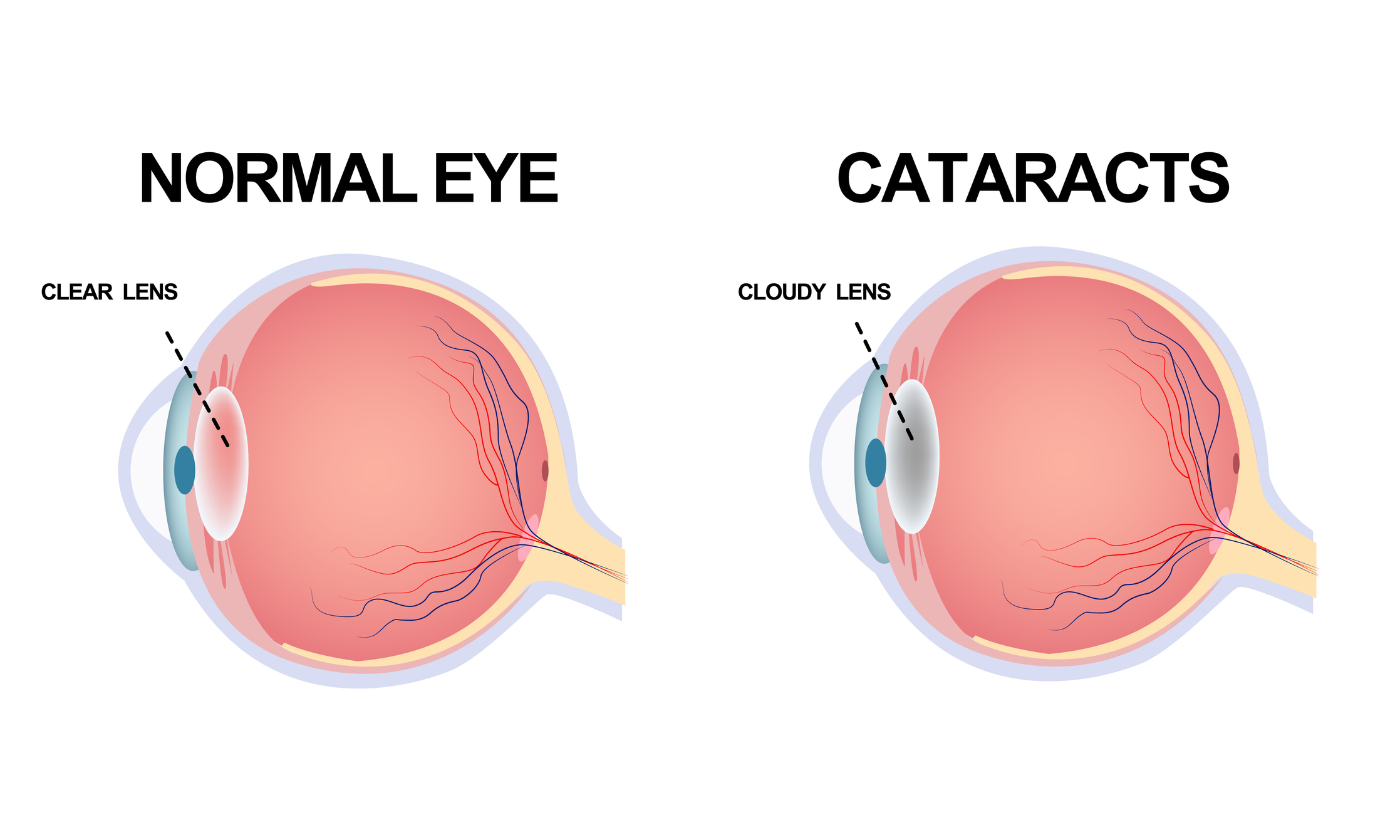When Do Cataracts Occur?
Cataracts occur when the natural proteins in the lenses begin to deteriorate, causing cloudy vision, reduced color vibrancy, and the appearance of light halos at night. To counteract these concerns, cataract surgery can be performed to restore crisp, clear vision and with it, quality of life. In most cases, the eye lens is replaced with an artificial lens. Dr. Ajit Nemi at Lotus Vision draws from decades of experience and uses best-in-class technology to help his patients regain their confidence and peace of mind with cataract surgery in Atlanta, GA.
What Are Cataracts?
Cataracts are among the most common reasons for blindness and vision loss in the world. With this condition, the lens becomes cloudy instead of clear. It can feel similar to looking at the world through a dirty car window where everything appears hazy, dull, and blurry.
What are the symptoms of cataracts?
- Blurry vision
- Reduced vision at night
- Double vision
- Oversensitivity to light
- Faded colors
What Causes Cataracts?
The most common cause of cataracts is the natural aging process. The American Academy of Ophthalmology (AAO), reports that changes in the eye that can lead to cataracts begin to occur at approximately 40 years of age, when proteins that make up the lens of the eye along with water begin to break down. When the protein clumps together, it can cause clouding of the lens, known as a cataract. This issue is what cataract surgery in Atlanta addresses.
Other Causes of Cataracts
Other causes of cataracts may include:
- Genetics
- Hypertension
- Diabetes
- The use of certain medications
- Injury or trauma
- Previous eye surgeries
- Sun damage
Cataracts Explained
The Process of Cataract Removal
Atlanta Cataract Surgery Patient Reviews
Cataract Surgery: Fixed vs Adjustable Lens
What are the surgical options for correcting cataracts in Atlanta?
Dr. Nemi, Lotus Vision founder and advanced cataract surgeon in Atlanta, has multiple solutions for cataracts at his fingertips and will recommend the best approach for your unique eye condition. He will conduct a detailed consultation process to listen to your concerns and create a personalized treatment plan for resolving your vision loss. He may choose from the following techniques:
Phacoemulsification
Phaco, also known as phacoemulsification or small incision cataract surgery, is the most common cataract surgery. In this procedure, a very small incision is made on the side of the eye’s clear dome-shaped cover called the cornea. Through this tiny incision, the surgeon inserts a probe that safely emits ultrasound waves that break down the cloudy lens so that it can be suctioned out and replaced by an artificial IOL (intraocular lens).
Extracapsular surgery
The alternative to phaco is a slightly more invasive procedure, called extracapsular surgery, where the incision made spans the side of the cornea, allowing the cloudy core of the afflicted lens to be removed in one piece and the remainder of the lens to be suctioned out.
Phacoemulsification and extracapsular surgery are usually followed by inserting an artificial replacement lens, called an IOL, or intraocular lens, which come in a wide range of types:
- Monofocal IOLs can help you focus on objects at a distance but may require reading glasses.
- Presbyopia-correcting IOLs can help you to focus on up-close objects
- Multifocal IOLs help you focus both near and far away, and can be personalized to you, possibly making eyeglasses unnecessary.
- Extended Depth of Focus IOLs can provide both excellent distant and medium vision, and improved up-close vision

How Safe is Cataract Removal Surgery?
One of the most common surgeries performed in the United States, cataract removal is an incredibly safe and effective procedure. The National Eye Institute (NEI) reports that approximately 90 percent of people who have cataract surgery have greatly improved vision after the procedure.
Cataract surgery in Atlanta, GA is typically carried out on one eye at a time. An anesthetic is applied to the eye prior to the surgery, which typically only takes 10 minutes to complete.
How Is Cataract Removal Performed in Atlanta?
Dr. Nemi at Lotus Vision serves Alpharetta and the Atlanta, Georgia area, performing cataract removal using state-of-the-art surgical techniques and the most advanced technology. In most cases, the procedure is completed in less than ten minutes and does not require a needle, stitches, or an eye patch.
Cataract surgery in Atlanta is performed on an outpatient basis under topical anesthesia and intravenous sedation. After you are sedated, and drops are applied to your eyes, Dr. Nemi will carefully remove the cloudy natural lens. Then he will insert an intraocular lens (IOL) as a long-term replacement.
The IOL provides focusing power as a substitute for the natural lens. IOLs are made of different materials and designed for different functions. Dr. Nemi will select the most appropriate IOL for your eyes. Various types are available, including astigmatism-correcting and multifocal IOLs.

What Are the Benefits of Cataract Removal?
On top of improving a patient’s vision, cataract surgery can have other benefits.
Improved Quality of Life
Better vision allows you to do more. Cataracts can prevent patients from carrying out their daily tasks, such as driving, reading, and other things that they enjoy doing. Patients whose vision is severely impacted by cataracts often feel less independent and less able to connect with other people socially.
Decreased Risk of Falls and Fractures
Falls are a major issue for older patients, as they can lead to injury or death. The impaired vision associated with cataracts can greatly reduce a patient’s ability to see properly. Recent data from the Journal of the American Medical Association (JAMA) shows that patients have a much lower risk of falling after undergoing cataract surgery.
Improved Longevity
In addition to improving quality of life, cataract removal may improve the odds of living longer for people with cataracts. In a recent study published by the National Institutes of Health (NIH), researchers found that cataract surgery is associated with significantly better long-term survival among older people. The study found a 40 percent reduction in mortality risk for people with cataracts who have surgery to remove them, as compared to those who do not.
WHAT IS THE BEST LENS TO GET FOR CATARACT SURGERY?
MONOFOCAL IOLS
Monofocal IOLs are set to one specific distance of focus, which can be focused for reading, mid-range sight, or seeing far distances. The distance vision setting is the most common one. This setting improves driving and walking ability. Patients who choose monofocal IOLs typically need eyeglasses to see things that are close up.
TORIC IOLS
Toric IOLs lenses are designed specifically to correct astigmatism, near-sightedness, and long-sightedness. Patients can see further distances with ease.
MULTIFOCAL IOLS
A multifocal IOL is designed to aid patients in seeing both near and far away. However, the light-altering aspects of the lenses can be bothersome for some patients.
Which is the best lens for you? The ideal lens to choose for cataract surgery ultimately depends on the patient’s unique vision needs. Those who are comfortable with wearing glasses following cataract surgery can do well with a monofocal lens. Those who wish to have greater freedom from eyeglasses both from far and near distances and can tolerate minor glaring around lights may enjoy the multifocal intraocular lens. Ultimately it all depends on what the patient is looking for in terms of improving their vision and maintaining an enjoyable lifestyle.
DOES EYESIGHT DETERIORATE AFTER CATARACT SURGERY?
Your eyesight won’t deteriorate after cataract surgery unless another vision problem arises, such as macular degeneration or glaucoma.
It is the general consensus that eyesight does not worsen following cataract surgery unless other vision problems start to develop, such as macular degeneration or glaucoma. The best way to safeguard against such developments is to work with an experienced, skilled cataract surgeon who uses only the latest technology and methods. The most frequent cause of blurry vision following cataract surgery is known as posterior capsule opacification. This condition is defined as a layer of cell growth that develops behind the lens implant. These cells distort light as it hits the eye, causing visual blurring. If this develops, patients will need to undergo a simple YAG laser capsulotomy procedure to correct it.
CAN CATARACT SURGERY RESTORE 20/20 VISION?
While many patients end up with 20/20 vision from their IOL, approximately 30-50% of patients who choose to receive a monofocal IOL will still need to get corrective lenses after undergoing surgery. While cataract surgery definitely improves the patient’s overall ability to see, it is likely that they will still need to wear glasses or contact lenses, especially when reading and driving. Some patients may prefer to achieve this goal by way of LASIK.
HOW LONG DO CATARACT LENSES LAST?
One of the best things about IOLs is that they never wear out and never have to be replaced. Nonetheless, it’s important to follow the doctor’s aftercare instructions to ensure that the eyes heal properly. In most cases, cataract lenses last a lifetime.
Cataract Surgery FAQs
How long will cataract surgery take?
The surgical portion usually only lasts about 20 to 30 minutes. Overall, patients are usually in the office for about 2 to 2 ½ hours when receiving this treatment.
Is cataract surgery painful?
Cataract surgery is a painless procedure. Numbing eye drops are applied before the surgery to ensure that patients are comfortable throughout.
How can one avoid getting cataracts?
While cataracts are considered to be a natural result of the aging process, there are some precautions that can be taken in order to decrease the likelihood of developing them. Refraining from smoking and drinking (alcohol), eating a healthy diet, wearing sunglasses regularly, and taking care of any health problems early on are all great ways to prevent cataracts.
How much does cataract surgery cost?
In most cases, cataract surgery is covered by vision insurance plans and usually costs around $3,500 - $5,000 per eye, depending on the condition of the patient’s eyes and what treatments are required.




